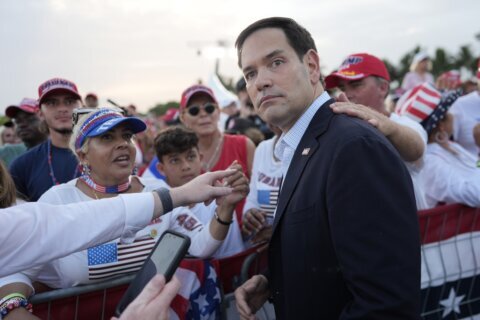Apple Inc. (ticker: AAPL) was the first company to reach a market capitalization of $1 trillion in 2018. The company continues to hold global attention as the most valuable company in the world since 2011, but it is still flirting with restoring its recent $3 trillion milestone. While the journey has been longer than expected, much like Dick Fosbury did with the high jump, Apple continues to set the bar as the leader of only six companies to surpass a trillion-dollar-plus valuation.
[Sign up for stock news with our Invested newsletter.]
These companies have had to overcome a slew of global obstacles, including the continued pandemic recovery, wide-ranging worker needs and demands, intermittent supply chain challenges and the economic complications from the ongoing Russia-Ukraine conflict. They are also working to find their place in the quickening pace of technology, especially within the artificial intelligence realm. Many of these companies are now working to maintain a consistent voice with climate sustainability and social credentials, as well as weathering the newest tensions in the Middle East.
The 10 most valuable companies in the world for 2023 by market capitalization are:
| Company | Sector | Market Capitalization |
| Apple Inc. (AAPL) | Technology | $2.7 trillion |
| Microsoft Corp. (MSFT) | Technology | $2.46 trillion |
| Saudi Arabian Oil Co. (2222.SR) | Energy | $2.15 trillion |
| Alphabet Inc. (GOOG, GOOGL) | Communication Services | $1.75 trillion |
| Amazon.com Inc. (AMZN) | Consumer Cyclical | $1.33 trillion |
| Nvidia Corp. (NVDA) | Technology | $1.1 trillion |
| Meta Platforms Inc. (META) | Communication Services | $815.71 billion |
| Berkshire Hathaway Inc. (BRK.A, BRK.B) | Financial | $740.25 billion |
| Tesla Inc. (TSLA) | Consumer Cyclical | $699.42 billion |
| Eli Lilly & Co. (LLY) | Health Care | $559.61 billion |
Eli Lilly & Co. (LLY)
Eli Lilly is the newest entrant to this formidable list of companies. The firm originated in 1876 under Eli Lilly, a pharmaceutical chemist and former Union colonel in the Civil War. Headquartered in Indianapolis, Indiana, Eli Lilly made its mark by being the first company to mass produce Jonas Salk’s polio vaccine. Lilly now has operations in 18 countries and distribution in 125 countries.
While best known for producing Prozac, Cymbalta and Zyprexa, its highest revenue comes from its line of diabetes drugs, Humalog and Trulicity. Its innovation in diabetes medications has enabled it to be a pioneer in human insulin using recombinant DNA and biosimilar insulin.
Eli Lilly has made several acquisitions in order to diversify its holdings, including the $38 million purchase of Elizabeth Arden in 1971. It doubled its profits with the cosmetic manufacturer and ultimately sold Arden in 1987 to Faberge for $657 million. It has also taken positions with agricultural chemicals, medical equipment and drug delivery services.
Eli Lilly has been at the forefront of the recent off-label use of diabetic medicine to treat obesity. It is the sole patent holder of tirzepatide, which it has contracted out to produce its blockbuster drug Mounjaro. The company is currently actively defending its patent from weight loss clinics and compounding pharmacies that are attempting to reproduce the drug’s weight loss results at a lower price point. Eli Lilly is beefing up its acquisition and research focus on additional drugs to treat diabetes and obesity, as well as Alzheimer’s and autoimmune treatments that are also expected to have significant growth potential.
Tesla Inc. (TSLA)
Tesla, created in 2003 and now headquartered in Austin, Texas, topped our list of the 10 most valuable car companies in the world earlier this year. It made an early bet on electric vehicles and continued to advance the niche concept through innovations in both battery life and charging range. The company now is now in three countries, operates six massive Gigafactories and has successfully delivered more than 1.3 million vehicles. Its once-majority share of the EV market is under considerable new pressure from BYD Co. (OTC: BYDDY), a Chinese EV and battery firm. Ford Motor Co. (F), Stellantis NV (STLA), General Motors Co. (GM) and Rivian Automotive Inc. (RIVN) are already challenging Tesla in the domestic truck market.
Much of Tesla’s dominance was expected to diminish as more auto companies made the change to electric vehicles. But Tesla has shown to be up to the challenge. It recently announced that its 2024 Cybertruck has a 500-mile range with a towing capacity of 14,000 pounds and boasts a top-tier Tri Motor package, for an estimated sticker value of around $80,000. Additionally, the Tri Motor offers zero to 60 mph acceleration in 2.9 seconds. A truck with an 800-mile range is expected to follow.
Tesla’s geographic positioning in superchargers gives it first-mover status among consumers who are concerned about battery range and infrastructure. In 2023, major car companies such as Fisker Inc. (FSR), Ford, General Motors, Hyundai Motor Co. (OTC: HYMTF), Honda Motor Co. Ltd. (HMC), Mercedes-Benz Group (OTC: MBGYY), Nissan Motor Co. Ltd. (OTC: NSANY) and Rivian, among others, have announced that starting in 2025, they are adopting Tesla’s North American Charging Standard.
Tesla has continued to drive auto-price reductions to appeal more meaningfully to mainstream consumers, and it has achieved parity with many popular internal combustion engine models. As the EV market continues to evolve, Tesla has added additional consumer services, such as auto insurance. Tesla Energy, a subsidiary, manufactures solar energy hardware, such as solar roof tiles, solar panels and Powerwall, an integrated stationary battery system.
Berkshire Hathaway Inc. (BRK.A, BRK.B)
The oldest company on this list, Berkshire Hathaway was the culmination of a series of mergers. The Valley Falls Company in Valley Falls, Rhode Island, was started in 1839 under Oliver Chace and merged 50 years later with the Berkshire Cotton Manufacturing Company to form the Berkshire Fine Spinning Associates.
A merger with Hathaway Manufacturing Company in 1955 enabled the new firm to survive into the next decade despite the downturn in textiles. By the mid-1960s, the firm was trading far below its working capital. The Oracle of Omaha, Warren Buffett, started accumulating shares, intending to make only a modest investment. Then-CEO Seabury Stanton made what Buffett believed to be a lowball offer, and he chose instead to buy the entire company. He ultimately regretted his emotional response to the perceived slight, but it ultimately reinforced his more disciplined approach, which has been one of the hallmarks of his professional success.
The purchase was also one of the first investments in Buffett’s transition away from his Buffett Partnership, setting the stage for his continued success. As chairman and CEO, Buffett has run Berkshire Hathaway with the same due diligence, long-term patience and integrity that continues to rain accolades on him. The multinational conglomerate earns capital through the sale of insurance (most notably Geico and reinsurance giant Gen Re) and then diversifies the earnings over about 60 companies, including brands such as NetJets, Clayton Homes, Acme Brick Co., See’s Candies and the Burlington Northern Santa Fe railroad, and alongside partial investments in Coca-Cola Co. (KO), American Express Co. (AXP) and Pilot Flying J. Berkshire acquired an additional 41.4% ownership share of Pilot in January 2023.
Buffett’s diligence as a value investor paid off handsomely in 2022, when he maintained positive returns as the S&P 500 was in the red by almost 20%. However, the first of the year battered several stock positions as the market prematurely believed that inflation was being adequately tamed by the Federal Reserve’s rate-hiking actions. Conversely, the higher inflation was beneficial to Berkshire’s insurance holdings. Berkshire’s diversification and slow-and-steady approach have been rewarded with favorable operating profits, enabling the company to maintain its position in this ranking.
Berkshire has also invested heavily in domestic oil and gas concerns, as well as smaller energy production subsidiaries. It receives significant tax credits from its wind-powered electricity generation. Its balance sheet continues to be incredibly strong and, coupled with a long-term investing focus, is well positioned for additional acquisitions.
[See: Artificial Intelligence Stocks: The 10 Best AI Companies.]
Meta Platforms Inc. (META)
Originally known as TheFacebook Inc., Facebook began in 2004 at Harvard University in Cambridge, Massachusetts, launched by now-CEO Mark Zuckerberg and four fellow students. In 2021, Meta Platforms was the culmination of a complete corporate rebrand to focus on the metaverse. Meta derives an overwhelming majority of its revenue (97.5%) from advertisements on multiple platforms: Facebook, Instagram, Messenger and WhatsApp.
The metaverse is an immersive virtual experience where users come together to connect and be entertained as they are in the real world. The metaverse would enable users to experience social media content, online gaming, and both augmented and virtual reality experiences. Ultimately, users are expected to be able to browse and shop using a virtual “trying on” experience to determine whether a purchase will look and feel as they anticipate. Cryptocurrency would also potentially enable monetization of these experiences.
Meta just announced its latest Ray-Ban Meta Smart Glasses collection in partnership with EssilorLuxottica. Prescription-lens compatible in either an iconic Ray-Ban Wayfarer or Headliner rim style, the glasses allow wearers to livestream directly to Facebook or Instagram. They can also engage with Meta AI, an advanced conversational assistant accessible by saying, “Hey Meta.”
Large-language model and consumer-focused generative AI are coming under additional regulatory scrutiny over privacy and intellectual property concerns. While AI has been a huge boost for Meta, taking its market cap from $700.5 billion in 2022 to $815.7 billion now, future valuations will reflect the public’s acceptance of Instagram and Facebook public posts, photos and texts being used in AI model training.
Nvidia Corp. (NVDA)
Rounding out the current companies in the $1 trillion-plus club, tech company Nvidia began in 1993 in Santa Clara, California, as a developer and manufacturer of graphics processing units. GPUs were originally used for video gaming and PC graphics, but more powerful versions are deployed in supercomputing applications. Nvidia’s growth has exploded as its GPUs are increasingly used for cryptocurrency mining centers that validate digital currency transactions.
In addition to GPUs, Nvidia produces application programming interfaces (APIs) and automotive and mobile computing system-on-a-chip units (SoCs). Nvidia is also becoming a powerhouse in artificial intelligence hardware and software systems, claiming almost 100% market share with applications such as Nvidia Drive, which powers all 30 top autonomous vehicle data centers. Leaders in health care, architecture, gaming, AI robotics and data factories credit Nvidia products and services with aiding their technical advances.
Nvidia was astute in recognizing that the quick and simultaneous computations required for advanced gaming were a natural fit for artificial intelligence. Generative AI, such as ChatGPT and Bard, craves Nvidia’s chips more than ever. Nvidia also has become perhaps the world’s most important tech company because it has made a mark on the entire ecosystem, from chip to software application. It also added cloud services for AI model training in mid-May 2023. For his insight, Harvard Business Review named Nvidia’s Jensen Huang the “World’s Best-Performing CEO.”
Nvidia is also looking to the future with more than 4 million developers in its Nvidia Developer Program and 14,000 global startups in its business accelerator, Nvidia Inception. Equally important, younger workers seeking a different work-life balance helped Nvidia become one of Glassdoor’s “Best Places to Work in 2023.”
Amazon Inc. (AMZN)
Amazon was founded in Bellevue, Washington, in 1994 in Jeff Bezos’ renovated garage as an online marketplace for books. From there, Amazon exploded into a logistics and technology behemoth known for its e-commerce, Amazon Web Services (AWS) cloud computing, digital streaming and book publishing empire. Amazon also owns Whole Foods Market, IMDB.com, Ring home security devices and Zoox, an autonomous vehicle company, among other subsidiaries. Amazon has continued its growth with its integration of artificial intelligence throughout its operations. Overall, Amazon has become the largest online retailer in the world, with more than 200 million users worldwide.
AWS has been a major driver of growth, and Amazon has a leading market share of global cloud services in Germany, India, Japan, the U.S. and the U.K. Highly profitable, Amazon is now expanding its AWS services through Bedrock, which allows customers to deploy artificial intelligence models on AWS.
Amazon has also made major inroads in the health care sector, first with PillPack, a 2018 acquisition that delivers medications directly to consumer’s homes. Then in 2023, it acquired primary care provider One Medical. It has since taken the next logical step, launching telemedicine services with Amazon Clinic. Blue Shield of California recently announced that it is shifting its partnership with CVS Caremark to Amazon Clinic.
Most important, Amazon has continued to build its reputation, visibility and trust within its markets. It has achieved the highest ranking, or nearly so, on the Harvard CAPs/Harris Poll, Axios Harris Poll, Boston Consulting Group’s Most Innovative Companies and Morning Consult’s Most Trusted Brands lists.
[READ: 7 Best Renewable Energy Stocks to Buy]
Google, based in Mountain View, California, was founded in 1998 by Larry Page and Sergey Brin. In 2015, Google was restructured, in the words of Page, to “form a cleaner and more accountable and better” company and allow Google to more efficiently broaden beyond its primary product line. The initial result was Alphabet, as a subsidiary of Google. But the company then reversed those roles so that Alphabet became Google’s parent company alongside its other multinational subsidiaries.
Google is most famously known for its search engine, but it shares Alphabet’s extensive research and development capabilities and offers services for Android operating systems, smart speakers and Pixel smartphones. Google also offers several popular products, including Gmail, YouTube and the navigation apps Waze and Maps.
Alphabet has been at the forefront of generative AI with Bard, although it ceded first-mover advantage to Open AI/ChatGPT, which cost it almost $16 billion in valuation. However, it is catching back up due to ChatGPT’s early stumbles in addition to well-received rollouts of AI features in Google Workspace and Google Cloud. AI is also embedded in the Pixel smartphone to enhance its photo-editing capabilities.
Much of Alphabet’s revenue comes from advertising, and AI features in Google and YouTube are designed to better align advertisements with user queries. Alphabet is also diving deeper into autonomous driving cars through its Waymo division, with the world’s first autonomous ride-hailing service, Waymo One. Launched initially in San Francisco and Phoenix, it is expanding to Austin, Texas, and Los Angeles.
Saudi Arabian Oil Co. (2222.SR)
Saudi Arabian Oil, also known as Saudi Aramco, is based in Dhahran, Saudi Arabia. The Saudi Arabian government, including the Saudi royal family and the country’s sovereign wealth fund, owns 98.2% of the company. Saudi Aramco holds the world’s second-largest proven crude oil reserves and produces three times more than its closest competitor, PetroChina Co. Ltd. (OTC: PCCYF).
This monopoly comes as a result of its ownership of the world’s largest onshore — Ghawar — and offshore — Safaniya — oilfields. Also included in its portfolio is the Master Gas System, the world’s largest single hydrocarbon network.
The firm trades in Saudi riyals on the Tadawul stock exchange, which is owned entirely by the Saudi sovereign wealth fund. Saudi Aramco started trading in December 2019, when it launched the world’s largest initial public offering, or IPO. It immediately exceeded the $1 trillion market cap threshold and crossed over the $2 trillion threshold on its second day of trading.
While its market cap is highly dependent on the price of oil, it has diversified with power generation and water desalination activities. Additionally, it is seeking further diversification through the mining of an estimated $1.3 trillion in phosphate minerals as well as other necessary minerals needed for clean energy production. In 2023, Saudi Aramco also announced that it was seeking to expand its investments in China.
Saudi Aramco is exposed to significant risks that are being further tested by geopolitical pressures from the Israel-Hamas war. Iran, which backs Hamas, has made aggressive overtures regarding the Strait of Hormuz in the past. The Strait is a deep but slim channel (only 30 miles wide at its narrowest point) that connects the Persian Gulf with open ocean. The Strait is primarily controlled by Iran and represents the most strategically important choke point for oil and natural gas from the Middle East.
The Organization of the Petroleum Exporting Countries (OPEC), of which Saudi Arabia is a founding member, is tasked with determining the appropriate production capacity to maintain market stability. A sudden or major change in worldwide energy pricing could create financial instability, both for Saudi Aramco and the greater global community.
Microsoft Corp. (MSFT)
Microsoft’s Windows operating system has long been the preferred choice in the business marketplace. Windows runs on nearly two-thirds of desktops worldwide, with Apple’s macOS coming in second at 19%, as of May 2023, according to StatCounter. That number is down from over 74% at the start of the year, but it’s still a comfortable lead.
However, Microsoft also has a wide-ranging portfolio that includes its Office software suite, Edge web browser and hardware such as Surface touchscreen personal computers and Xbox video game consoles. Through acquisitions, it also owns LinkedIn, Bing, the Azure cloud platform and other strategic interests. Headquartered in Redmond, Washington, Microsoft was founded by Bill Gates and Paul Allen in 1975 and crossed the $1 trillion market cap threshold in April 2019.
Microsoft has been surging in 2023 on the strength of its partnership with OpenAI, the San Francisco-based startup that owns ChatGPT. Shares rose to a record high in June 2023, creating a market cap of $2.6 trillion as a result of ChatGPT’s first-mover status.
ChatGPT almost immediately ran into scores of negative press over privacy and compliance issues, security and data leakage, intellectual property concerns, and even racial and gender bias. But Microsoft and OpenAI have responded with new upgrades designed to curb these issues. Technical specialists note that ChatGPT has experienced performance downgrades from scaling pains, as more organizations tap into the chatbot. However, the company’s technical workforce has been working around the clock to optimize the platform to keep up with growth.
Apple Inc. (AAPL)
Apple has been a clear winner for many years because it has made its products consumer-intuitive and its service consumer-friendly. In a story that most people know, the tech giant was founded in Cupertino, California, in 1976 by Steve Wozniak, Steve Jobs and Ronald Wayne. While initially marketing the Apple I personal computer, they found their footing with their second iteration, the Apple II, allowing them to go public in 1980.
Since then, Apple’s rise has been meteoric, claiming the first $1 trillion market cap in 2018, then $2 trillion in 2020 and $3 trillion in 2022 before settling in just under the $3 trillion mark. Apple’s product lineup includes smart devices — iPhone, iPad and Watch — and MacBook computers, AirPods, the App Store and iCloud services. AppleTV+ is a streaming service showcasing Apple’s original programming.
Apple is now facing its most critical headwind due to its dependence on the Chinese market, where it derives 20% of its revenue. China’s admittance to the World Trade Organization in 2001 enabled Apple to access inexpensive labor resources and global supply chains. Over 22 years later, China has become Apple’s major manufacturing hub, with more than 95% of its products made there. Apple also sells 24% of its iPhones in China, compared to 21% in the U.S.
However, China’s economic strength has waned. Investors are pulling billions out of the Chinese stock market on deflation concerns, the deceleration of the yuan and a collapsing real estate market. Three presidential administrations have imposed trade sanctions, most notably to restrict Chinese access to semiconductor tech.
China’s latest response has been to restrict iPhone use by central government employees and to order Apple (and others) to cease offering apps, such as Instagram and Facebook, within the country. Many iPhone users use virtual private networks (VPNs) to access blocked web content that violates Chinese censorship rules. Apple is now eyeing India as a replacement, but it will take time to transition.
In the meantime, Apple continues to release new products, including the latest iPhone 15 and enhancements to the Apple Watch and Airpods Pro. It has focused primarily on the consumer experience, building on camera capabilities with a new tetraprism lens and a sleeker titanium frame, among its many enhancements. Apple’s flagship iPhone is its most expensive phone released to date, but it has been plagued with overheating, power drainage and screen burn-in issues.
An initial patch appears to have resolved the thermal complaints, but users are hitting the chatrooms hard about these major issues, along with a host of smaller miscues. Many are questioning the quality coming from India as compared to China, making the manufacturing transition especially critical.
What’s On the Horizon?
Analysts have said that the next large growth trend for these valuable companies is most likely to come from innovations in artificial intelligence. Speculation is rampant that Microsoft is poised to overtake Apple for the coveted No. 1 spot. Alphabet, Amazon and Nvidia could also overtake Apple if this trend bears out.
More from U.S. News
7 Stocks That Outperform in a Recession
7 Ways to Invest in the Energy Storage Boom
7 of the Best High-Yield Bond Funds
The 10 Most Valuable Companies in the World by Market Cap originally appeared on usnews.com
Update 10/24/23: This story was previously published at an earlier date and has been updated with new information.







